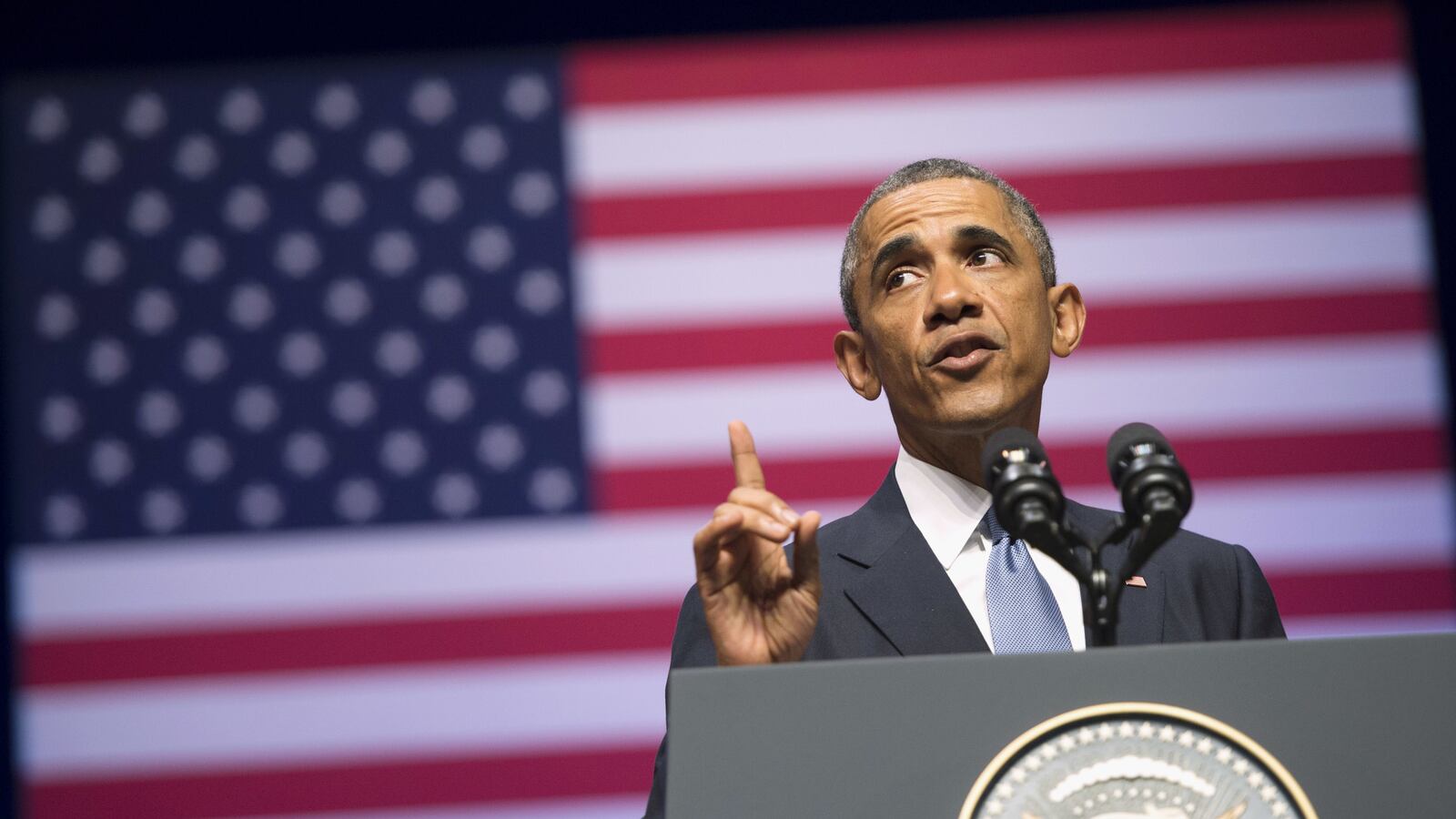We read so many stories about this “critical juncture” or that “pivotal moment” in foreign policy that it’s hard to know which to take seriously. “Whither NATO?” has been a hardy if sleepy perennial since the North Atlantic Treaty Organization was founded in 1949.
But this time the credibility of NATO, the international order in the Middle East and Europe, and the foreign policy legacy of Barack Obama’s presidency are all genuinely on the line.
If that’s not enough, so is the role of the United States in the world. Can we lead anymore? If we can’t lead the NATO alliance on this, what can we lead on?
So when the president leaves Wales after this week’s NATO summit, he must leave as the leader of a unified, disciplined, and determined “West”—to use the old term. Then he needs to explain to the world in stark language how the United States will build a coalition to crush the barbarous ISIS insurgency and stand up to the schoolyard bully known as Vladimir Putin.
This is a tall order, especially for a president even Sen. Dianne Feinstein calls “too cautious.” But if Obama leads now, we’ll soon forget his recent history of being buffaloed by Putin. We’ll forget that press conference gaffe where he said he had no strategy yet to fight what he calls ISIL. We may even stop noticing that the president and the press can’t even agree on which acronym (ISIS or ISIL?) to use for 13th-century barbarians.
In both regions, Obama—now the senior NATO leader after Germany’s Angela Merkel—is aiming for a muscular multilateralism that’s somewhere between the murky, “messy” (his word) world of shifting alliances and the armchair warriors at home who want him to act like Winston Churchill.
Taking out the jihadists isn’t as easy as it looks, in part because of a steady supply of reinforcements from abroad. And the subtleties are endless. Working the Rubik’s Cube of Iraq, Iran, Syria, Saudi Arabia, Turkey (not to mention the Sunnis, Shiites, Alawites, Kurds, and myriad factions within) would be a full-time job for any president.
But, contrary to the bleatings from Capitol Hill, there’s not much disagreement on how to handle ISIS. U.S. warplanes have already flown more than 100 sorties to degrade ISIS ground forces, and many more bombs are on the way. There will be unanimity at Wales on hitting the jihadists harder in the weeks ahead.
Russia is a different story. For weeks, NATO has been saying that a Russian attack on eastern Ukraine is coming. On a call early this week with the head of the European Commission, Putin was caught on tape saying he “could take Kiev in two weeks.” This sounds outlandish but must be taken seriously.
What to do? Mobilizing a 4,000-soldier rapid response team, NATO’s expected response, seems necessary but not sufficient, like the modest economic sanctions now in place. How about staging large-scale NATO military maneuvers at the border and freezing the assets of the kleptocracy?
Whatever Obama’s past misjudgments, you can be sure he is carefully weighing these and other options, trying not to use all his pressure points at once.
On one level, Obama’s appreciation of nuance and complexity equips him well to confront the two-front crisis. For instance, his decision two years ago not to arm the Syrian rebels is looking smart in retrospect; if he had, large numbers of those weapons would have fallen into the hands of ISIS. Obama is what was once called a “long head”—a leader who patiently tries to think a few moves past everyone else. This is a good thing. Thinking hard before reacting is usually the wiser course.
But at a certain point, reacting is another word for losing. Presidents must act at least as much as they react; they must seize the initiative and thrust their enemies on the defensive. Sometimes threatening war is the only way to keep the peace. Obama knows this abstractly, but it’s at odds with his interpretation of history and his assessment of the mission of his presidency, which is to end wars, not start them.
To put it in terms of compelling historical metaphor, Obama is a “Guns of August” guy. The book of that title, by Barbara Tuchman, chronicles how bluster and a series of miscalculations led European powers to blunder into World War I exactly a century ago.
The other historical analogy that generations of policymakers carry around in their heads is “Munich.” That is British Prime Minister Neville Chamberlain’s appeasement of Adolf Hitler at the 1938 Munich Conference, which led to World War II. In that analogy, Ukraine is Czechoslovakia, which contained enough restive Germans in the Sudetenland region to give Hitler the excuse he needed to carve the country up.
Obama has apparently decided that negotiating over eastern Ukraine, which contains many ethnic Russians, is not the same as negotiating over Czechoslovakia, even though in both cases the country being dismembered—Czechoslovakia then, Ukraine now—was excluded from the talks over its own fate.
The core of the president’s problem is that Putin knows he’s not a Munich man, and that gives the Russian thug some leverage.
When one adversary is willing to risk war and the other isn’t, the bellicose leader has the tactical advantage.
Obama is right that when it comes to a major nuclear power like Russia, prudence is the best policy. The writer Anne Applebaum recently sketched out a plausible scenario for World War III starting in Ukraine, thanks to a new fanaticism emerging among some Putin boosters in Moscow.
Applebaum seemed to put her argument in a Munich context, but it fits more snugly in the Guns of August world of miscalculation, the one that guided President Kennedy, a big fan of Tuchman’s book, when he avoided war with the Soviet Union in the early 1960s.
Kennedy didn’t draw his lines as quickly as many remember. It took many months before the centrality of Berlin emerged, and no one dared call influential Sen. William Fulbright an appeaser in 1961 when he endorsed the erection of the Berlin Wall as a way to avoid war.
Obama’s challenge is to draw lines more credible than the one than he drew against Syrian President Assad’s use of chemical weapons—a line Assad crossed, though he eventually destroyed such weapons.
Obama's neo-Cold War line will apparently be drawn in the Baltics (thus his visit to Estonia on Wednesday), not in eastern Ukraine. He made this clear in the Estonia speech, when he said: “We’ll be here for Estonia. We will be here for Latvia. We will be here for Lithuania. You lost your independence once before. With NATO, you will never lose it again.” That’s a pledge to fight for the Baltic states—a pledge he did not make for Ukraine, which even Roosevelt and Churchill conceded was in Russia’s sphere of influence.
To the dismay of the Munich crowd, which believes the only language Putin understands is military strength, Obama and the Europeans have opened up a diplomatic channel on Ukraine, which looked a little hapless this week when Putin scotched efforts to negotiate a ceasefire.
The deal, negotiated by Russian experts from the Clinton and Bush administrations, makes sense. It calls for U.N. peacekeepers, a withdrawal of Ukrainian and Russian forces and a guarantee that Ukraine does not become part of NATO. Backed by NATO solidarity and economic sanctions with teeth, it just might isolate Putin enough that he backs off.
Sometimes the United States doesn’t realize how much it has going for it. In 1949, when the treaty creating NATO was signed, Secretary of State Dean Acheson thought the Pentagon was so weak that NATO would be crushed by the Soviet Union and its mighty Red Army. At the signing ceremony, according to Walter Isaacson and Evan Thomas’ The Wise Men, Acheson noted that the band’s selection of show tunes included “I’ve Got Plenty of Nothing” and “It Ain’t Necessarily So.”
Today, the West has plenty of plenty—its military and economic strength dwarfs anything available to Russia, much less ISIS. But to make it so—to keep the peace—the United States and its European allies must act in concert to show the world yet again that might can never make right.






